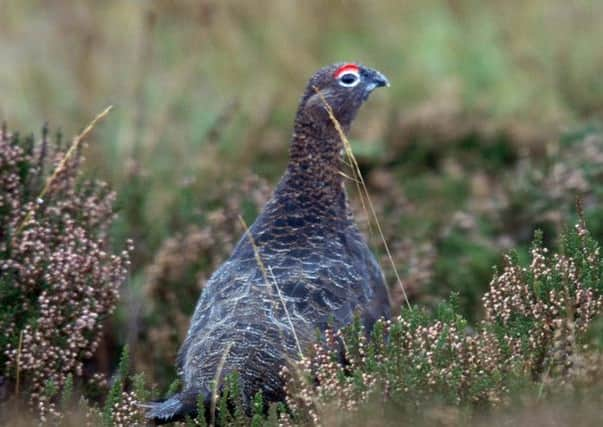Call for grouse shooting be formally licensed


The Scottish Raptor Study Group, a network of 300 experts on Scottish birds of prey, claims that the “maverick side” of the red grouse industry in Scotland has failed over many years to put its house in order.
And the organisation has written to Paul Wheelhouse, the Scottish Environment Minister, demanding that new licences be introduced to control grouse shooting in Scotland.
Advertisement
Hide AdAdvertisement
Hide AdA report, published last month by RSPB Scotland, revealed that the number of birds of prey illegally poisoned in Scotland in 2012 had fallen to its lowest level since records began in 1989. Seven birds of prey, including a golden eagle and two buzzards, were killed as result of deliberate poisoning last year - less than half the death toll of 17 birds in 2011.In 2009, a total of 45 birds were illegal poisoned North of the border.
But the Raptor Study Group argues that additional safeguards are needed to protect the birds from the risk of further persecution.
The group states: ”Taking the obvious difficulties that golden eagles encounter in trying to survive - let alone breed - on extensive parts of the land that is intensively managed for red grouse shooting along with the known adverse effects of this type of management on Scotland’s populations of hen harriers, goshawks and peregrines, we urge the Scottish Government to take more effective measures to put a stop to the present ongoing criminal persecution of these raptors on much of such land.
“There is a need also for such measures in some other parts of the Highlands and in Southern Scotland.”
The experts claim: “Increasingly the evidence is stacking up that, despite allegations to the contrary, it is not just a few who in the red grouse industry are involved in raptor crime but that the problem is rife throughout much of this industry. Looking to wider issues and as is now being recognised belatedly, there are clear biodiversity disadvantages in the intensification, sometimes extreme intensification, of red grouse management practices that is taking place increasingly in much of this bird’s Scottish range.
Maverick
“We contend that the maverick side of the red grouse industry has failed over many years to put its house in order, that it still has no intention of doing so and that it is in contempt of the species protection laws that are justifiably in place.”
The letter continues: “We feel that, this part of the private sector having failed conspicuously in these respects, the public sector must be more closely involved now in rectifying matters. Our view is that the Scottish Government should institute as quickly as possible a system of licensing of red grouse management, backed up with stringent sanctions and should adopt other countries’ practices aimed at curbing wildlife crime in general and raptor persecution in particular, where these would seem to be useful in the Scottish context.”
The group states that licences should only be issued to grouse shooting enterprises which can prove they are fit to hold them.
Advertisement
Hide AdAdvertisement
Hide AdThe Scottish Gamekeepers Association dismissed the call. A spokesmansaid: “Perpetual over-regulation against responsible estates will simply put people off from investing in Scotland’s countryside, gamekeepers will be taken off the moors and the species which help sustain golden eagles, such as red grouse and hares, will gradually disappear in tandem with the lack of management.
“The SGA consistently advocates that legal solutions are the only way to deal with problems where there are conflicts and has been quick to deal with proven cases of persecution, if its own members are involved.
“However, it does not feel that introducing a sweeping catch-all licensing system, which will ultimately damage the species it is designed to protect, is a sensible or workable solution.”
Mr Wheelhouse said he would respond to the “complex” call for licensing.He said: “The Scottish government introduced strengthened legislation by way of the Wildlife and Natural Environment (Scotland) Act 2011, and introduced further new measures in July 2013. The legislation needs to be allowed to take its course. Robust and effective law enforcement is the next step in the continued efforts made here in Scotland to tackle ongoing crime.
“We believe that it is right to make the best use of existing legislation.However, as indicated in the past, other options would be considered if the current legislative framework (now augmented by the new measures announced in July 2013) was not achieving its objectives. This is a complex proposal, which would require careful consideration and consultation.”
ends
The Scottish Gamekeepers Association dismissed the call. A spokesmansaid: “The SGA finds it short-sighted that the Raptor Study Group, whose sole focus is raptors, should be advocating a broad brush licensing of grouse moors.
“Perpetual over-regulation against responsible estates will simply put people off from investing in Scotland’s countryside, gamekeepers will be taken off the moors and the species which help sustain golden eagles such as red grouse and hares will gradually disappear in tandem with the lack of management. The examples of this are many and stark and, indeed, the first Langholm Moor project is a pertinent example of what happens to wildlife, including raptors, when gamekeepers are removed.”
He continued: “This move, therefore, to license all grouse moors in a broad brush fashion, to catch a few bad estates, will unwittingly be of damage to golden eagles. The SGA consistently advocates that legal solutions are the only way to deal with problems where there are conflicts and has been quick to deal with proven cases of persecution, if its own members are involved.
“However, it does not feel that introducing a sweeping catch-all licensing system, which will ultimately damage the species it is designed to protect, is a sensible or workable solution.”